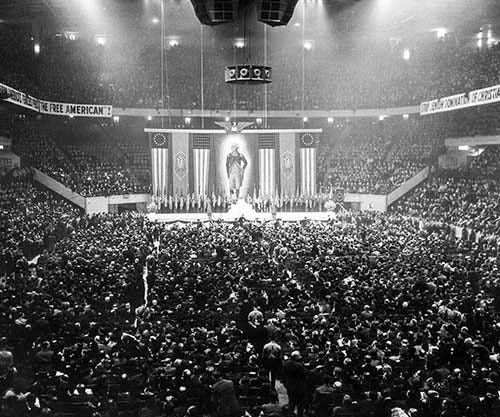Ken Burns's "The U.S. and the Holocaust Series is Shocking
Even If You Think You Know What Happened.
Many in the audience that will come to the series premiering on PBS September 18 will bring their own life stories with them.
Mine began in India, where my Polish-Jewish refugee parents found safety and left for the United States at the end of 1943 with me in a basket and a visa that was as hard to get as it was welcome. They were, according to the series, among the 200,000 European Jews who got U.S. visas while six million others were murdered.
That era became known as the Holocaust, a distinct episode in the long and bloody history of human brutality.
Here are thoughts I had while watching the more than six hours, in three parts:
• The horrors of the Holocaust have been recounted for decades in books, movies, and exhibits. Experience the series, as much as is possible, by clearing your mind, recognizing that the Holocaust ended seventy-seven years ago, one full lifetime. And the judgments will now belong to history rather than survivors’ stories or earlier impressions.
• The series portrays politics at the highest level. Franklin Delano Roosevelt had to contend with a powerful America First movement, steeped in anti-Semitism, in the years before the war. His military then argued that the best way to end the annihilation of the Jews was to defeat the Nazis, rather than try to save victims. He also allowed his State Department to undermine appeals to abandon discriminatory visa quotas. Should FDR, a hero to many Jews of the wartime generation for his social and economic policies, actually be condemned?
• And there is the compelling story of the Otto Frank family, including his daughter Anne, whose diary in hiding is still so widely read. The family photos and the account of one of Anne’s childhood friends – whose mother later became Otto Frank’s second wife – was, to me, stunning. Every family had a story, and a great many were tragic.
• A question becomes inescapable watching the footage of well-dressed men and women and their children marched to extermination: What would you have done in those years to escape or avoid concentration camps and death? Courage and luck were basic ingredients for survival. There were partisans fighting from the forests and the Warsaw ghetto uprising of 1943, but of the six million who died, most did so without resisting. How my own parents made it out of Poland is a saga I write about in my memoir An Especially Good View: Watching History Happen. To my regret, I never delved as deeply as I should have with them as to how it felt to have escaped when so many could not.
• What did it feel like to be an American Jew while this was happening? Leaders like Rabbi Stephen Wise and Secretary of the Treasury Henry Morgenthau were notable for their efforts. But what about the doctors, professors, and merchants, those with comfortable American lives? I kept comparing the scale of American Jewish rallies on behalf of Soviet Jews in the 1970s seeking to emigrate with what were, ultimately, tepid protests during the war. Many Americans today believe that news coverage of the Holocaust was limited during the war. But the series shows multiple examples of news stories and newsreels that made an undeniable case for explaining what was underway in Europe. It was only in 1968 that Arthur D. Morse wrote While Six Million Died: A Chronicle of American Apathy, a quarter century after the events it described. The narrative of American neglect during the war itself is now accepted fact.
• And finally, there is the issue of Israel, which is not a central theme of the series. Next year is the seventy-fifth anniversary of the founding of the Jewish state, which was a consequence of the Holocaust, among other developments of that time. Israel, a full lifetime since the Holocaust, is a successful and powerful nation, but among American Jews it is increasingly controversial. As I watched film of the unfolding discriminatory Nazi policies against Jews in the 1930s, my uneasy feeling was that similar things are being said about the way Israelis treat Palestinians on the West Bank and in Gaza. And indeed, today many major global organizations (like Human Rights Watch and Amnesty International) as well as human rights groups in Israel say that the Israeli government’s policies toward the Palestinians amounts to the legal definition of apartheid.
Whatever else “The U.S. and the Holocaust” does, it makes you think, hard.







Very interesting - will watch. One comment -- how could the U.S., or the Allies, stop the Holocaust without battling the Wehrmacht? There were so many Einsatzgruppen and death camps in Germany and countries it overran that the only way to stop the Holocaust was to defeat the Germans militarily.